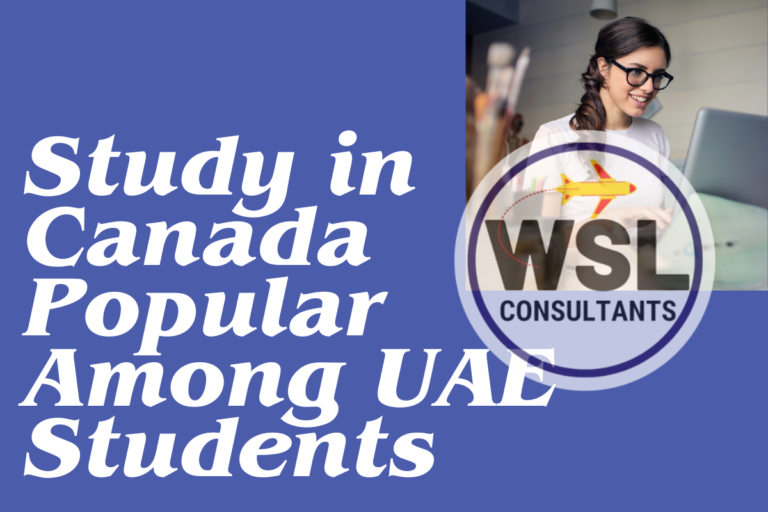Embarking on a journey to study in Canada from the UAE is an exciting endeavor that requires meticulous planning and thorough research. This article aims to guide aspiring students through the essential steps, ensuring a smooth transition to Canadian academic life.

Universities to study in Canada
Choosing the right university is a pivotal decision that significantly shapes your academic journey. To commence this crucial process, delve into the exploration of renowned institutions celebrated for their academic excellence. This involves an in-depth analysis of various factors that collectively contribute to the overall educational experience.
Start by scrutinizing the program offerings of prospective universities. Evaluate the diversity and quality of courses available, ensuring they align with your academic goals and career aspirations. Consider the depth of specialization, the flexibility of curricula, and the presence of any unique programs that might distinguish a particular institution. Beyond academics, scrutinize the campus facilities offered by each university. A conducive learning environment is essential for your overall development. Assess the quality of classrooms, laboratories, libraries, and recreational spaces. A well-equipped campus fosters a holistic learning experience, providing the resources necessary for academic success and personal growth.
Moreover, take into account the available resources at each university. This includes faculty expertise, research opportunities, and extracurricular activities. A faculty with diverse expertise enhances the learning experience, while ample research opportunities contribute to a vibrant academic atmosphere. Look for universities that encourage student involvement in various activities, clubs, or organizations, promoting a well-rounded education.
To make an informed choice, consider seeking insights from UAE students or alumni. Their experiences can provide valuable perspectives on the university’s culture, support systems, and overall atmosphere. Attend university fairs, information sessions, or virtual events to gather firsthand information and connect with representatives from different institutions. In essence, the process of choosing the right university involves a comprehensive evaluation of program offerings, campus facilities, and available resources. By considering these factors, you ensure that the institution aligns not only with your academic goals but also with your personal and professional aspirations, setting the stage for a rewarding educational experience.
Understanding Admission Requirements
Before immersing yourself in the application process, it is crucial to acquaint yourself with the admission requirements. These prerequisites serve as the initial checkpoints that determine your eligibility for enrollment. Among the fundamental criteria, two commonly encountered are academic prerequisites and English language proficiency tests.
Academic prerequisites constitute the foundational academic qualifications expected from applicants. These may include specific high school courses, minimum grade point averages (GPAs), or standardized test scores. Familiarizing yourself with these requirements enables you to assess your academic standing in relation to the university’s expectations, ensuring you meet the baseline criteria.
Equally essential is proficiency in the English language, often assessed through standardized tests like the TOEFL or IELTS. These tests evaluate your ability to comprehend, communicate, and engage effectively in English, a vital skill for academic success in an English-speaking environment. Meeting the stipulated language proficiency benchmarks guarantees that you can navigate the coursework and communicate proficiently throughout the study in Canada.
By understanding and fulfilling these admission requirements, you establish a robust foundation for a successful enrollment process. Thorough preparation and adherence to these criteria not only enhance your chances of acceptance but also set the stage for a fulfilling and academically rewarding experience at the chosen institution.
Application Process
The application process for study in Canada involves several crucial steps that require careful attention and thorough preparation. Below is a breakdown of the key components of the application process:
- Research and Choose Your Program:
- Begin by researching the available academic programs in Canadian universities. Choose a program that aligns with your educational and career goals.
- Select a University:
- Explore different universities based on their academic reputation, program offerings, campus facilities, and location. Consider factors such as the university’s ranking and its suitability to your preferences.
- Check Admission Requirements:
- Familiarize yourself with the admission requirements for your chosen program and university. This may include academic prerequisites, standardized test scores, and language proficiency tests like IELTS or TOEFL.
- Prepare Application Materials:
- Gather all required documents, which typically include transcripts, letters of recommendation, a resume or CV, a statement of purpose, and proof of language proficiency. Ensure that these documents meet the specified guidelines.
- Create an Online Application:
- Most Canadian universities require applicants to submit an online application through their respective portals. Fill out the application form carefully, providing accurate and complete information.
- Pay Application Fees:
- Pay the required application fees, which vary among universities. Ensure that you meet the payment deadlines to avoid any complications with your application.
- Submit Your Application:
- Submit your online application before the specified deadline. Double-check that all required documents are attached and that the application is complete.
- Receive Letter of Acceptance:
- Once your application is reviewed, you will receive a letter of acceptance if you are admitted to the program. This letter is crucial for the next steps, including visa application.
- Apply for a Study Permit:
- If accepted, apply for a study permit through the Canadian immigration authorities. This permit allows you to stay and study in Canada. Ensure you meet all the requirements and submit the necessary documents.
- Plan for Accommodation:
- Explore on-campus or off-campus housing options and make arrangements for accommodation well in advance. Consider factors such as location, cost, and amenities.
- Prepare for Arrival:
- Plan your arrival to study in Canada, considering transportation, airport transfer, and any initial orientations offered by the university.
By following these steps meticulously, you can navigate the application process effectively and increase your chances of a successful admission to a Canadian university.
Financial Planning
When planning your study in Canada, it’s essential to make a precise estimation of both tuition and living expenses. This step is crucial in crafting a well-informed and sustainable financial plan. To ensure a smooth academic journey, consider the following steps:
Estimating Tuition Costs: Begin by researching the tuition fees of the selected universities and programs. Take into account any variations in fees based on your chosen field of study in Canada. Additionally, factor in potential annual increases in tuition. This foresight allows you to formulate a more accurate projection of your overall educational investment.
Exploring Living Expenses: Living costs can vary significantly based on the city and lifestyle. Consider expenses such as accommodation, food, transportation, textbooks, and personal expenditures. Engage in thorough research or consult with current students to gain insights into the cost of living in your chosen city. This comprehensive understanding ensures that you are well-prepared to manage day-to-day expenses.
Seeking Scholarship Opportunities: Explore the array of scholarship opportunities available for UAE students to study in Canada. Many institutions and external organizations offer financial aid based on merit, need, or specific criteria. Dedicate time to researching and applying for relevant scholarships, as they can significantly alleviate financial burdens and contribute to a more affordable educational experience.
Adequate Financial Planning: Creating a detailed budget is a key component of adequate financial planning. Factor in all anticipated expenses and compare them against your expected sources of income, including personal savings, family support, and potential part-time employment. This comprehensive approach enables you to identify potential gaps and proactively address financial challenges.
By diligently estimating tuition and living expenses, exploring scholarship opportunities, and engaging in meticulous financial planning, you can embark on your study in Canada with confidence. Adequate preparation in this regard ensures that financial considerations do not become a hindrance to your educational pursuits, contributing to a stress-free and enriching experience during your study in Canada.
Student Visas and Permits
When considering study in Canada, navigating the visa application process emerges as a pivotal and critical step in your journey. The key focus lies in obtaining the necessary study permits, and a thorough understanding of the requirements is imperative to ensure a smooth application process and avoid potential delays in your travel plans.
Understanding the Visa Application Process: Commence your journey by thoroughly acquainting yourself with the intricacies of the visa application process. Understand the specific steps, deadlines, and documentation needed to successfully apply for a study permit. Familiarize yourself with the official website of the Canadian immigration authorities to access accurate and up-to-date information.
Study Permit Requirements: One of the central components of your visa application is the study permit. This document allows you to study in Canada. Take the time to comprehend the specific requirements for obtaining a study permit. These may include a letter of acceptance from your chosen institution, proof of financial support, and a valid passport. Ensuring that you meet all these requirements is vital for a successful application.
Document Organization and Verification: Efficiently organize all required documents and verify their accuracy before submission. Any discrepancies or missing information could lead to delays in the processing of your application. Double-check that your passport is valid for the intended duration of your stay and that all supporting documents are current and in the prescribed format.
Avoiding Delays in Travel Plans: Delays in the visa application process can have a significant impact on your travel plans. To mitigate this risk, start the application process well in advance of your intended departure date. Adhering to deadlines, submitting all necessary documents promptly, and addressing any additional requirements or inquiries from immigration authorities promptly can help avoid unnecessary delays.
By prioritizing a clear understanding of the visa application process, adhering to study permit requirements, and ensuring meticulous document organization, you not only enhance the likelihood of a successful visa application but also minimize the risk of delays in your travel plans. This proactive approach sets the foundation for a smooth transition to your study in Canada.
Accommodation Options
When it comes to finding accommodation for your study in Canada, a crucial decision lies in choosing between on-campus and off-campus housing, a choice influenced by your preferences and budget considerations. On-campus housing provides the convenience of proximity to classes and university facilities, fostering a sense of community among students. It’s an excellent option for those who prefer the convenience of being in the academic hub and engaging in campus activities.
On the other hand, off-campus housing offers a broader range of choices, allowing you to explore different neighborhoods and lifestyles. This option may be more appealing if you seek greater independence and desire to immerse yourself in the local community. Off-campus living also provides flexibility in terms of housing types, from apartments to shared houses, catering to various preferences.
Budget considerations play a pivotal role in this decision-making process. On-campus housing may include meal plans and utilities, streamlining your monthly expenses. In contrast, off-campus options might offer more flexibility in terms of pricing, giving you the opportunity to explore cost-effective living arrangements that align with your financial plan.
To make the most of UAE student experience, it’s essential to weigh the pros and cons of each housing option. Consider factors such as proximity to campus, lifestyle preferences, and financial constraints. Engage in thorough research, seek advice from university housing services, and explore local rental markets to make an informed decision that not only fits your budget but enhances your overall study in Canada.
Cultural Transition
Adjusting to Canadian culture as an international student may present challenges, but embracing this experience can significantly contribute to personal growth and a fulfilling academic journey. Recognizing and preparing for cultural differences is a crucial aspect of this adaptation process.
To navigate these challenges successfully, it’s essential to proactively educate yourself about Canadian customs, traditions, and social norms. Understanding the cultural context will not only help you integrate more smoothly but also foster meaningful connections with peers and the local community. This proactive approach demonstrates a willingness to engage with the Canadian way of life, fostering a more enriching experience.
Moreover, seeking support from international student services offered by universities is a valuable resource. These services are specifically designed to assist international students in acclimating to the new environment. They often provide orientation programs, cultural workshops, and mentorship opportunities to facilitate a seamless transition. Connecting with fellow international students through these services can create a supportive network, offering guidance and understanding during the adjustment period.
Preparing for cultural differences is not about erasing one’s identity but rather embracing diversity and cultivating an open-minded perspective. The willingness to learn, adapt, and engage in the Canadian cultural landscape not only enhances personal growth but also contributes to a more inclusive and interconnected global community within the university setting and beyond.
Health Insurance
Understanding the Canadian healthcare system is vital. Obtain comprehensive health coverage to ensure you have access to medical services throughout your stay.
Part-time Work Opportunities
Gaining a comprehensive understanding of the Canadian healthcare system is crucial for UAE students during their study in Canada. Canada boasts a publicly funded healthcare system that provides essential medical services to residents and eligible visitors. It is imperative for students to acquaint themselves with the nuances of this system to ensure they have access to necessary healthcare services throughout their study in Canada.
To navigate the Canadian healthcare landscape, international students must obtain comprehensive health coverage. While some provinces offer basic coverage for international students, it may not cover all medical expenses. Therefore, acquiring additional health insurance is advisable to bridge potential gaps in coverage and guarantee access to a broader range of medical services.
Comprehensive health coverage typically includes essential services such as doctor visits, hospital stays, prescription medications, and emergency medical care. Having this coverage not only safeguards students from unexpected healthcare costs but also ensures they receive timely and adequate medical attention when needed.
It is essential to research and select a health insurance plan that aligns with individual needs and preferences. Universities often provide guidance on recommended insurance providers catering to the specific requirements of UAE students. By proactively securing comprehensive health coverage, students can prioritize their well-being and focus on their academic pursuits with the confidence that their healthcare needs are adequately addressed throughout their study in Canada.
Exploring Canada
Canada’s diverse landscape provides an abundance of travel opportunities for international students. It’s an invitation to venture beyond the academic realm, encouraging students to take the time to explore the country’s captivating attractions. Immerse yourself in Canada’s multicultural environment and seize the chance to make the most of your international experience.
From the breathtaking natural beauty of national parks to the vibrant urban life in cities like Toronto, Vancouver, and Montreal, Canada offers a rich tapestry of experiences. Take advantage of your time in this vast and varied country by exploring iconic landmarks, such as the Niagara Falls, Banff National Park, or the historic sites in Quebec City. Embrace the opportunity to witness the Northern Lights in the Yukon or experience the cultural festivities in diverse communities.
The multicultural environment in Canada adds a unique dimension to your international experience. Engage with local communities, participate in cultural events, and savor the diverse cuisines that reflect the country’s rich immigrant heritage. By actively immersing yourself in the Canadian way of life, you not only broaden your perspectives but also create lasting memories that go beyond the academic sphere.
Consider joining student clubs or organizations that facilitate cultural exchange, allowing you to connect with both fellow international students and Canadians. This not only enriches your social experience but also contributes to a deeper understanding of the country’s cultural fabric.
In essence, Canada beckons international students to go beyond the classroom and textbooks. It encourages exploration, cultural immersion, and the creation of lasting memories. By taking the time to discover the country’s attractions and embracing its multicultural environment, you can enhance your international experience and create a well-rounded, memorable chapter in study in Canada.
Post-Graduation Options
As you approach the conclusion of your study in Canada, it’s crucial to proactively prepare for life after graduation. One significant aspect of this preparation involves gaining a comprehensive understanding of the work permit options available to international students. Exploring these opportunities for employment and considering long-term plans for study in Canada can significantly shape your post-graduation trajectory.
Understanding Work Permit Options: Begin by familiarizing yourself with the various work permit options offered by the Canadian government. The Post-Graduation Work Permit (PGWP) is a common avenue that allows graduates to work in Canada for up to three years after completing their studies. Understanding the eligibility criteria, application process, and potential extensions is essential to making informed decisions about your post-graduation employment.
Exploring Employment Opportunities: Explore potential employment opportunities aligned with your field of study and career goals. Leverage university career services, job fairs, and networking events to connect with prospective employers. Additionally, consider internships, co-op programs, or entry-level positions to gain valuable Canadian work experience, which can enhance your employability after graduation.
Considering Long-Term Plans: Beyond immediate employment prospects, it’s prudent to contemplate your long-term plans for study in Canada. If you aspire to establish a more permanent presence, research the pathways to permanent residency, such as the Express Entry system or provincial nominee programs. Understanding the requirements and processes for these pathways can inform your decisions and actions during the post-graduation phase.
By proactively addressing work permit options, exploring employment opportunities, and considering long-term plans, you position yourself for a smoother transition into the Canadian workforce. This strategic approach not only enhances your chances of securing meaningful employment but also contributes to your overall success and fulfillment in study in Canada.
Conclusion
Study in Canada from the UAE involves a series of well-planned steps, from university selection to post-graduation options. By following this comprehensive guide, aspiring students can navigate the complexities of international education with confidence.
FAQs
- Can I work part-time while studying in Canada?
- Yes, international students are allowed to work part-time during their studies.
- Are there language programs available to improve my English skills?
- Canadian universities often offer language programs and support services to enhance language skills.
- How do I find affordable accommodation in Canada?
- Explore both on-campus and off-campus housing options, and consider shared accommodations for cost savings.
- What healthcare options are available for international students in Canada?
- International students typically need to purchase health insurance to cover medical expenses during their stay.
- What are the post-graduation work permit options for international students?
- Canada offers various post-graduation work permit options, allowing students to gain valuable work experience after completing their studies.






